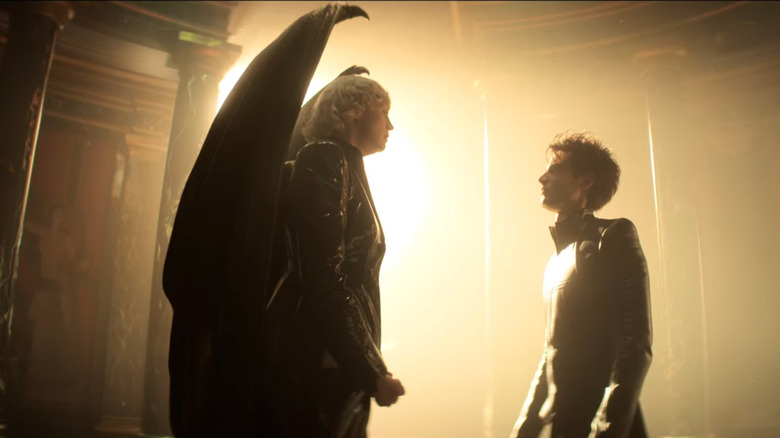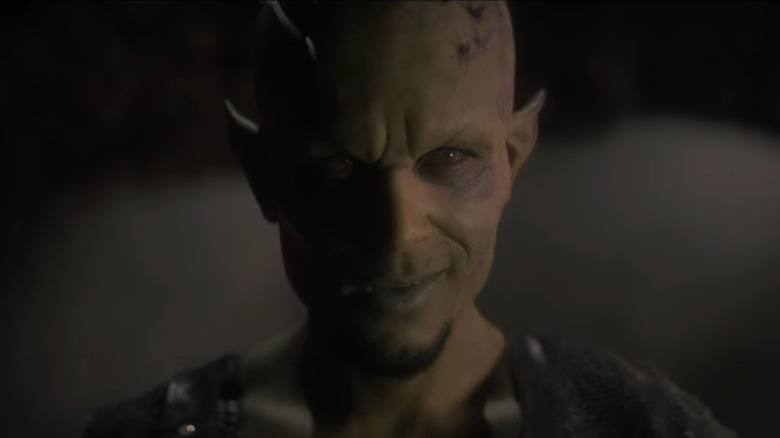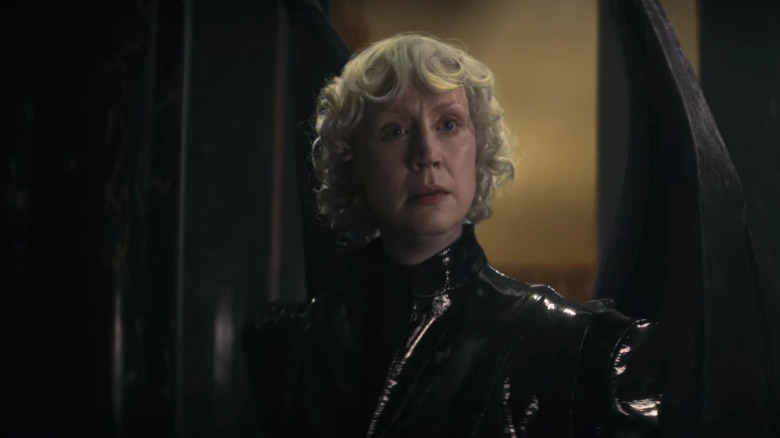The Oldest Game: Lucifer And Dream's Battle In The Sandman Explained
Anyone who has attended Sunday school, or a few moments of any preacher's sermon, would assume a duel with Lucifer includes searing flames, ripping flesh, and endless torment. Because of these traditions, many believe Lucifer to be the ultimate Boogeyman. As the ruler of Hell and Lord of demons, the fallen angel who disobeyed God is a formidable opponent, and one few would challenge.
Dream of the Endless (aka Morpheus), the lead character in Netflix's adaption of the classic comic series "The Sandman," has spent eternity creating nightmares, which has prepared him for encounters with monstrous creatures and environments. And sparks fly when the King of Hell and the Lord of dreams clash. The beloved comic by writer Neil Gaiman and a murderer's row of artists features Morpheus locked in a battle with a demon, but the Netflix show stacks the deck, and calls Lucifer up to the big show.
In the series, the battle between Morpheus and the devil is a battle of wits that dominates any spooky tale spun from church pulpits.
Morpheus vs. Choronzon
Neil Gaiman's "The Sandman" is a rightfully popular work of intricate storytelling and compelling characters that offers a solid foundation for the Netflix series. In the original comic, Morpheus travels to Hell to get his helm back from a demon, Choronzon, but the creature won't hand it over. Morpheus refuses to leave without his tool, so Choronzon agrees to fight him for it. If Morpheus loses, he is stuck in Hell as the demon's slave, and if he wins, he gets his helm back. Morpheus agrees.
If you're thinking the Lord of dreams seems a bit fragile for a fist fight, don't worry, supernatural beings are above the passé use of fists and feet. Instead, the two engage in "The Oldest Game," where each opponent uses a concept from their imagination to best the other. While it may have been interesting to see a sickly thin Dream duke it out with a demon from Hell, a battle of wits is far more intriguing. Sure, the thought of these two tearing flesh and gnashing teeth is scary, but it's far less interesting than watching two intelligent creatures search their limitless imaginations for brutal and savage ways to destroy each other.
Morpheus and Choronzon each equip dangerous ideas that include a serpent, an ox, anthrax, a sun, and a supernova. On his last turn, the demon chooses anti-life, and it appears that Morpheus has been bested, but the Lord of Dreams pulls out a last minute win by equipping hope. Game over.
The Netflix adaptation follows the basic beats of this battle, but it gets leveled up. Instead of facing the demon Choronzon, Morpheus must challenge Lucifer herself.
Morpheus vs. Lucifer
For the most part, the Netflix adaptation follows the familiar path laid out by the comic, but chooses to alter it when Morpheus enters Hell. In the series, Morpheus still ends up in Hell searching for his stolen helm, but he finds himself going up against Lucifer instead of Choronzon. Morpheus and Lucifer still engage in "The Oldest Game," and the same concepts are used. When confronted with anti-life, Morpheus equips hope, and Lucifer realizes that nothing beats hope. Once again, Dream wins, but the implications of the victory are completely different. It's one thing to embarrass a demon, but it's a whole other thing to beat the Devil in Hell.
The idea of dying is unsettling enough, but having your soul at the mercy of an ancient fallen angel in a fiery pit of damnation is far more terrifying, which is probably why Lucifer is so cocky. When the devil is chosen to fight Morpheus, the Lord of Hell appears smug and super confident, and almost beats the Lord of Dreams. However, just as he did in the comics, Morpheus wins. The loss must be incredibly embarrassing for the devil because it occurs in front of Choronzon and Mazikeen and threatens Lucifer's reputation. More importantly, it suggests that Morpheus is more powerful than Lucifer and Hell.
One episode after Lucifer's defeat, Morpheus confronts John Burgess, who is wrecking people's lives with the power of Dream's ruby. John believes that humans are liars, prone to violence and cruelty, but Morpheus explains that humans only become those things if they lose their dreams. In The Dreaming, humanity finds hope, which inspires them, and keeps them from becoming the worst versions of themselves.
Dreams win
While Lucifer's realm terrifies and subjugates damned humans, the Dreaming offers humanity inspiration, and the concept that beats the Lord of Hell, hope itself. Being bested by such a simple concept must be infuriating for Lucifer, after spending thousands of years building a reputation based on fear and torture.
Before leaving, Morpheus twists the knife in Lucifer's back a little deeper, by insisting that Hell would have no power if its subjects couldn't dream of Heaven. This reminds Lucifer of the recent loss, invokes the realm of God, and mocks the weakness of the Devil's power in one fell swoop. Morpheus' win of The Oldest Game and his parting insult are sure to leave an impression on Lucifer, who is bound to retaliate in the future. But, for now, the score is Morpheus 2, Lucifer 0.



